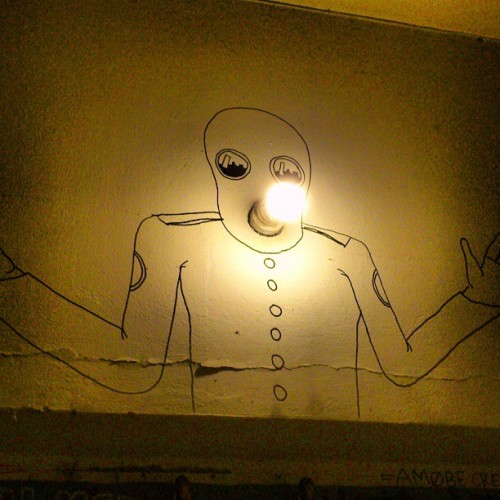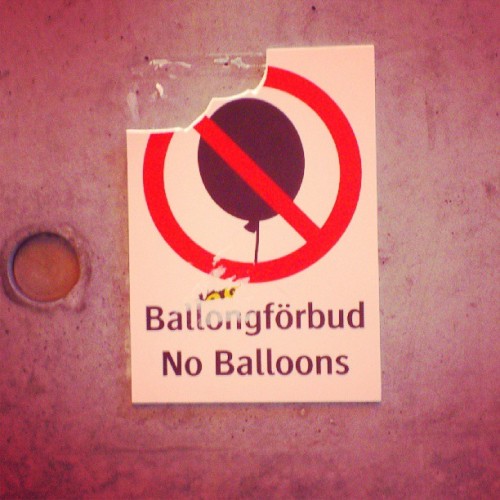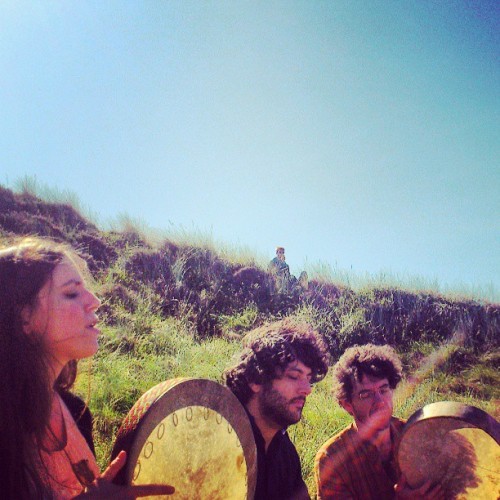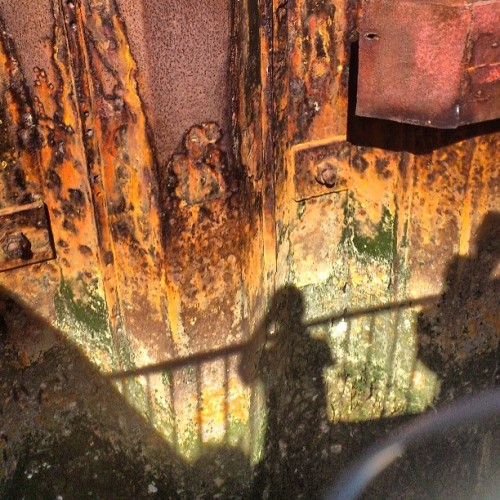
Moongazing Hare – Interview

Moongazing Hare is the Psych/Neo Folk project by still Copenhagen resident David Folkman Drost, who give some insight into the personal aspect of his music as well as what's rotten in the state of Denmark.
Turn on the (for now) exclusive track „How Many Days (In Defense of Calendars)“ and read what he has to say.
Moongazing Hare - How Many Days (In Defense of Calendars)
How are you, and where are you?
Hi Marcus, I am doing well, overall! I am in my flat in Copenhagen, in my underwear. My bedroom is also my rehearsal room and my recording studio, so I am in just the right place for this interview. My mouth tastes a little funny, and in an hour, I will take all the empty bottles down to the super market, and I will come back with bread, milk and chocolate. These are the most immediately pressing concerns I have.
Tell us about your project, "Moongazing Hare"
Moongazing Hare is the name I have come to use for all my "solo" recordings and performances. It can include others, especially live, but fundamentally, it is me. I think that using a pseudonym, or a totemic creature, allows me to be a little more personal than I might otherwise be comfortable with, and it also allows me to step away from myself, sometimes, and blur the lines of identity. The "identity" of Moongazing Hare can be very flexible, and I like that. Sometimes it’s about exploring myself and my feelings about very specific things, and at other times it is about getting rid of myself and exploring the world without my ego on my back. I realized recently that I am really bad at expressing unhappiness or discomfort in my daily life, and I think that may be why Moongazing Hare is to such a large extent “discomfort music.” I am not an unhappy person, although I do have to structure my life in a way that helps me manage a certain base level of anxiety and depression.
How, or why, did you begin? What inspired you?
I started making music quite late in life, maybe at age 23, at the earliest stages, but I was always a very involved listener. It felt like I was starting to discover simplicity and the value of quiet space in music around that time, and I started to hear something musical in incidental sounds that I hadn’t really noticed before, and it struck me that that was how I could start to create something . I was just playing around with instruments, and decided at a certain point to try to make music that would appeal to me, and to not be ashamed of my shortcomings. I’ve always been very serious about the art I wanted to make, but I’ve tried to be less serious about myself. That is still, very much what I am trying to do. I can of course be impressed by skilled musicians (and jealous of their talents) but equilibrism has never really been something I was strongly attracted to. As for inspiration, I guess I am a bit of a sponge. I feel pretty raw and thin-skinned, sometimes, and that is typically when I absorb the stuff that makes it into my music.
You did a „Death in June“ cover album. Why did you choose DIJ?
I did! I would never have done it if I didn’t love Death In June on some level. Actually, I LOVED Death In June for a while, and I think he helped open my ears to some ideas and ways of thinking about music. I still love some DIJ records, but others I can barely listen to, anymore, and I don’t really try to keep up. What Douglas Pearce has, when he is at his best, and what I find sadly lacking in most of the neofolk records that are copying his template, is an intense personal presence, and a vulnerability that takes it beyond mere stylistic exercise. I admire him, and I wanted to honour an artist that people sometimes roll their eyes at (sometimes for very good reason) and to highlight the things that I find gripping in his music and lyrics. Also, once I started working on it, a whole cover ep just seemed like such a terrible idea that I had to go through with it. That was also part of the logic behind my naked presence on the cover – I didn’t want to fall into the Good Taste Trap and I wanted to challenge my own vanity and shame. I am happy with how it all worked out, and I guess quite a few people – in my small-scale context - have ended up listening to it.
Did Douglas Pearce (DIJ) use up all combinations of the 3 chords he knows?
I guess after 12+ years my Bandcamp API key got revoked...
I am sure he did, at least once! And then 100 other bands did the same, only with nothing to say. But I am not really one to point fingers, since most of my songs tend to have just one or two chords, and I am really not bothered by the use of traditional folk idioms. The number of beautiful songs that have been built on top of the same simple structures is just staggering, and I think the potential is inexhaustible, as long as there are people with a great enough need to express themselves.
Death in June has been around, in some form or another, for over 30 years. Do you think they are still growing and changing?
I can’t really answer that. I think so. I think Douglas Pearce has a strong artistic vision for what he does. Does he sometimes tread water? Well, yes, to my ears there is a certain amount of repetition, but I strongly believe he is growing and changing.
Tell us about your latest record "The Sunderland Valves" and how is it connected to "The Sunderland Wreck" that was released in 2012. "The Sunderland Wreck" was more an experimental soundscape while your last record is more song oriented.
I guess after 12+ years my Bandcamp API key got revoked...
Those two records are both quite specific to their time and place. I lived on Sønder Land, in a small village on the south tip of Fanø, for a few years, with my ex-wife. When we split up, I needed to accept both the change in our relationship and the need to move away from the island, in order to get on with my life, so there was a whole lot of sundering going on. I think that with The Sunderland Wreck, I hadn’t quite gotten to the point where I could start to put things into words, and with The Sunderland Valves there was more conscious processing. I think of The Sunderland Valves as the fullest expression until now, of what I have been trying to do with Moongazing Hare, and Tarkovsky Green was really helpful in giving it form. It is not a happy record, but I hope it is not only self-pity that comes across. I am thankful for those years and how they shaped me. I hope the record expresses my love for the wild calm of the wadden sea and the dunes. I still love to go back there, and after loss there is always an upward trajectory that never leaves you exactly where you were. As you know, I am married again and moving to Sweden, and neither of those wonderful things would have happened, if I hadn’t gone through the painful loss of the things I was attached to before.
What's going on in Denmark right now? Any exciting things in music and arts that people should know about?
Oh, I am really glad to be living in Copenhagen! There is a lot of good stuff, going on, but I readily admit that I live in a bit of a bubble, so some of the things I am most excited about are not necessarily recognized by a lot of people. I want to plug Dendron Records, which is a DIY label/mutual support group I have started with a few very talented friends; Own Road, Taiga Taiga and Simon Broe, and some of the things we have on the way are just really exciting to me. We have played live together a lot and we are gradually moving towards closer and closer collaborations. My favourite band in Copenhagen, right now, is probably Distortion Girls – they’re just so fucking cool and sweet and noisy and talented that I can’t believe that nobody has offered to put their music on vinyl, yet (pro-tip to any labels, out there! You need some of that noise!). The same three people have a bunch of different projects going, and it is all pretty great. I could really go on for a while about people making beautiful sounds, like Kloster and Blood On a Feather, too, but I guess I should try to keep the list manageable.
What do you think about Denmarks latest, most prominent music export ICEAGE and their controversial use of certain symbols.
I really don’t think much about them, at all. I get the impression that they are doing their thing and that people are listening, so great for them, but I don’t really hang out in the same circles as those guys, and I don’t really care that much about what other people are into. I am an old man of 32. I like Moth! Moth is my favourite punk band in Copenhagen.
When it comes to the use of symbolism, I guess I should adress that, since I myself covered Death In June, which might make some people question my politics (for instance the guy behind the blog you are linking to). I think he is reaching too far to connect Iceage with political motives, and to be honest, I find this kind of histrionic anti-fascism counter-productive, because it misses the larger points by focusing on the small stuff. I am personally quite left-leaning in my politics and I would certainly describe myself as an anti-fascist, I am just much more concerned about the mainstream fascist tendencies creeping in from the populist right wing than I am about a group of teenage art punks appropriating certain symbols. The author is right to point out the despicable tendencies in Danish politics, but COMPLETELY wrong to draw a connection between that movement and Iceace. Those rightwingers are the top 40/local radio/Michael Bublé segment! The people we should really worry about are the “soft cultural supremacists” who pretend to protect freedom of speech and women’s rights, but really use it as a thin cover for their own xenophobia.
I think a lot of artists are frequently drawn towards the things that stir us, even if they create discomfort or repulsion. The only language we have to work in is that of culturally determined symbols, and it is the same space that is inhabited by these powerful images of white hoods or serial killers or whatever have you. I clearly remember drawing swastikas on my notebooks and even cutting a few into my skin, being at the same time acutely aware of the horrible connotations of the symbol (and actively politically engaged as a militant anti-fascist), but having an almost obsessive need to wrap my head around the power of that symbol and to see if it would change me somehow if I got closer to it. It’s a little hard to put into words as an adult what you are experiencing as a teenager, but I don’t think there has to be any connection between those drawings shown in the article and any political allegiance of the band. In fact, I think there is a very constructive side to recognizing the parts of ourselves that are similar to all the things we rightly hate in society, in order to combat them more effectively. You can’t in my opinion, be an effective anti-fascist, if you don’t accept that nazis are fundamentally human. They’re idiots, obviously, and the Iceage kids may or may not be idiots, I can’t say, but I don’t think they’re nazis.
What are your plans for the future?
Write more, better songs. Put out more, better records. Play more, better shows. Have more, better sex. Be married, safe, happy, honest, not-rich but also not-poor. Make art.
Specifically, I am trying to let my songs sit around a little longer before I record them, because typically what has ended up on my releases have been demos, recorded before the songs have really grown up. That is neither good nor bad, I just want to try something different, to see if it works for me.
I will also be recording and performing with The Restless Fields, which is a new collaboration between Philipp Bückle (Teamforest, Beth Kleist, Tarkovsky Green) and myself. We will be playing two shows in Dortmund on the 13th and 14th of September. The first night as Moongazing Hare, Teamforest and The Restless Fields at Sissikingkong (a café/restaurant, I think) and the second night we are playing a longer church concert as The Restless Fields, as part of the Halleluyeah festival.
Thank you for your interest, Marcus! It means a lot to me. And thank you for all the work you put into DFBM – you have turned me on to a lot of good stuff!
Thank you David, you turned me to a lot good stuff as well!
Good luck for Sweden and cheers to A.!
Thanks to Dr. Patty for proof reading and more.
moongazinghare.bandcamp.com
Facebook





Images pulled from David's Instagram

Write a comment, say something!